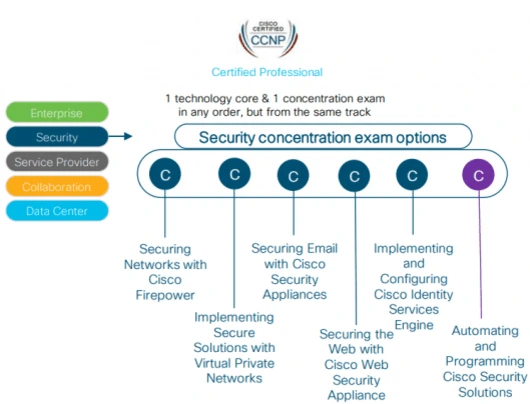As cyber threats evolve, businesses seek network security experts. CCNP Security certification empowers your career in this field. Explore its core topics, exam preparation, and career prospects in this guide.
Understanding CCNP Security
What is CCNP Security?
CCNP Security is a certification offered by Cisco. It is designed for network professionals who want to specialize in network security. This certification is recognized globally and demonstrates your ability to secure Cisco networks effectively.
Prerequisites for CCNP Security
To pursue CCNP Security, you should have a valid Cisco Certified Network Associate (CCNA) certification, or any Cisco Certified Internetwork Expert (CCIE) certification can act as a prerequisite. Additionally, practical experience in network security is beneficial.
Benefits of CCNP Security

- Demonstrates expertise in network security.
- Increases your employability and earning potential.
- Enhances your knowledge of Cisco security technologies.
Overview of CCNP Security Exams
CCNP Security certification consists of several exams, and passing them is essential to become certified. The core exams include:
- 350-701 SCOR (Implementing and Operating Cisco Security Core Technologies): This exam covers the fundamental security technologies that are used in Cisco’s security solutions.
- 300-710 SNCF (Securing Networks with Cisco Firepower): Focuses on Cisco Firepower and its capabilities in protecting network infrastructure.
- 300-715 SISE (Implementing and Configuring Cisco Identity Services Engine): This exam deals with implementing and configuring the Cisco Identity Services Engine, which is crucial for identity management.
- 300-720 SESA (Securing Email with Cisco Email Security Appliance): This exam concentrates on securing email communications using Cisco’s Email Security Appliance.
- 300-725 SWSA (Securing the Web with Cisco Web Security Appliance): This exam delves into web security and the use of Cisco’s Web Security Appliance.
Examining Core CCNP Security Topics
CCNP Security exams cover a range of core topics, each essential in securing network infrastructure. Understanding these topics is crucial for success in the certification. Let’s take a closer look at these core areas:
Network Security: It covers various security technologies like firewalls, intrusion prevention, and VPNs, requiring expertise in safeguarding networks from unauthorized access and threats.
Identity Management: Identity management involves managing user identities, access control, and authentication. Cisco’s Identity Services Engine (ISE) is a key player in this area.
Secure Connectivity: Secure connectivity focuses on ensuring that network connections are safe from eavesdropping and tampering. Technologies like VPNs are central here.
Threat Defense: Threat defense involves identifying and mitigating threats. Cisco’s Firepower technology plays a significant role in this domain.
Automation: Automation is becoming increasingly important in network security. Cisco emphasizes automation to streamline security processes and respond quickly to threats.
Preparing for CCNP Security Certification

Pursuing CCNP Security requires diligent preparation. Let’s check out some tips to get started:
Effective Exam Preparation:
- Stick to your study schedule.
- Use a variety of study resources, including official Cisco materials, books, online courses, and practice exams.
- Join study groups or forums to discuss topics and share knowledge with fellow candidates.
Recommended Study Resources:
- Cisco’s official certification guidebooks.
- Online courses from Cisco Learning Partners.
- Practice exams from reputable sources.
- Virtual labs to gain hands-on experience.
Time Management: Manage your time wisely while studying. Allocate specific time slots for study sessions and practice exams. Avoid procrastination.
Navigating the CCNP Security Exams
To succeed in CCNP Security exams, you need to understand the format, objectives, and difficulty level of each exam:
350-701 SCOR: Learning How to Imply Cisco Security Core Technologies:
- Exam Format: Multiple-choice and simulation questions.
- Objectives: Cover fundamental security technologies.
- Difficulty Level: Moderate.
300-710 SNCF: Securing Networks with Cisco Firepower:
- Exam Format: Multiple-choice and simulation questions.
- Objectives: Focus on Cisco Firepower.
- Difficulty Level: Moderate.
300-715 SISE: Setting up and configuring Cisco Identity Services Engine:
- Exam Format: Multiple-choice and simulation questions.
- Objectives: Concentrate on Cisco ISE.
- Difficulty Level: Moderate.
300-720 SESA: Protecting Emails Using Cisco’s Email Security Appliance.:
- Exam Format: Multiple-choice and simulation questions.
- Objectives: Address email security.
- Difficulty Level: Moderate.
300-725 SWSA: Protecting the Web with Cisco Web Security Appliance:
- Exam Format: Multiple-choice and simulation questions.
- Objectives: Focus on web security.
- Difficulty Level: Moderate.
Tips for Success
Success in CCNP Security exams depends not only on knowledge but also on exam-taking strategies:
Practice, Practice, Practice: Take practice exams to familiarize yourself with the question format and time constraints. This will help reduce exam anxiety.
Time Management During Exams: Allocate time wisely to each question.
Read Questions Carefully: Pay attention to the wording of questions. Cisco exams can be tricky, and details matter.
Career Opportunities with CCNP Security
Career opportunities with CCNP Security are both diverse and rewarding. Holding this prestigious certification opens doors to a range of job roles in the field of network security. Network Security Engineers are central in crafting, deploying, and overseeing security systems to safeguard data and networks.
Security Analysts monitor and address security issues, while Security Consultants collaborate with clients, assessing their security requirements and offering specialized advice. What’s even more enticing is the earning potential. CCNP Security professionals often command higher salaries due to their specialized skills, with income varying based on experience, location, and specific job roles. This certification not only validates your expertise but also paves the way for a successful and lucrative career in the dynamic world of network security.




